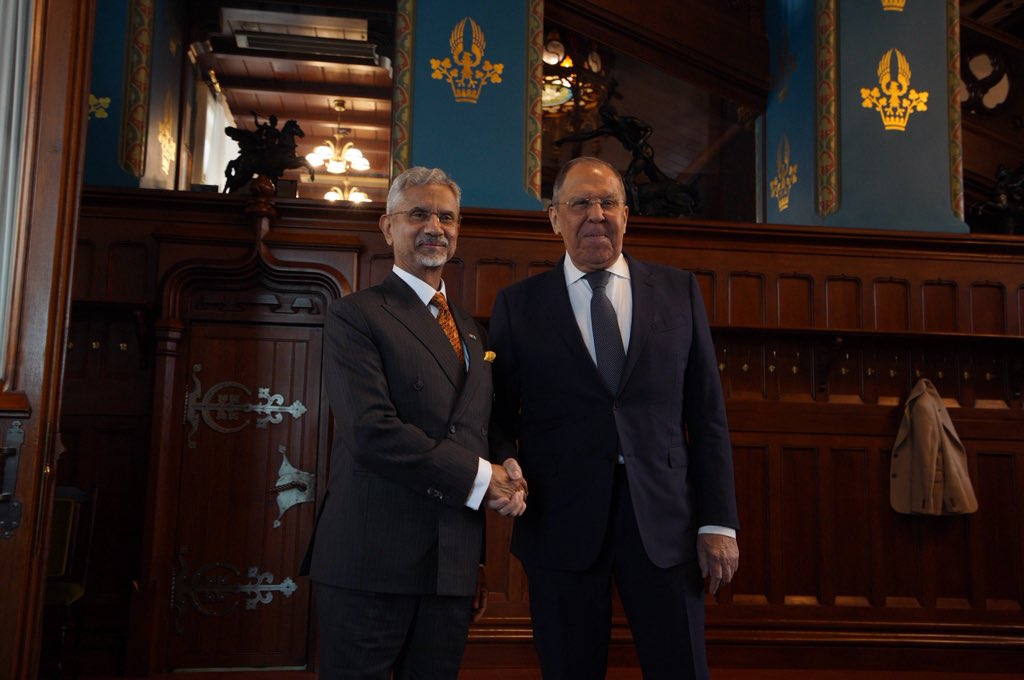India-Russia Deepen Strategic Ties Amid U.S. Tariff Pressure; Jaishankar-Lavrov Meet Sets Stage for Prez Putin Visit to India
India's External Affairs Minister S. Jaishankar met Russian Foreign Minister Sergey Lavrov in Moscow on Thursday, reinforcing New Delhi’s strategic alignment with Moscow in the wake of new U.S. tariffs and sustained criticism of India’s energy trade with Russia.
The two sides reviewed bilateral cooperation, reiterated support for multipolar engagement, and laid the groundwork for Russian President Vladimir Putin’s upcoming visit to India.
 |
| Image Source: EAM Jaishankar |
Jaishankar, addressing a joint press briefing alongside Lavrov, said the India–Russia relationship had remained one of the steadiest among major global partnerships since the Second World War. “Our leaders met in July last year and then again in Kazan.
These high-level engagements have consistently provided wise and practical guidance to our strategic partnership,” he said.
Lavrov confirmed that President Putin’s visit to India is being planned before the end of 2025 and will be accompanied by a substantial package of bilateral agreements.
“Today, we discussed the preparations for President Putin’s upcoming visit to India. We expect to review an extensive set of documents across energy, trade, and regional connectivity,” Lavrov said.
Their meeting follows escalating trade tensions between New Delhi and Washington. Earlier this month, U.S. President Donald Trump imposed an additional 25% tariff on Indian exports, raising the total tariff burden to 50%, citing India’s continued import of discounted Russian crude oil.
Jaishankar firmly defended India’s position on energy procurement. “We are not the biggest purchaser of Russian oil--that is China. Nor are we the largest LNG buyers--that is the EU.
The U.S. itself encouraged us to stabilise the global energy market. We are perplexed at the inconsistency in the argument,” he said, adding that India’s oil imports from the U.S. had in fact increased.
Lavrov backed India’s stance, criticising what he called Washington’s “illegitimate economic coercion.” He underscored Russia’s view that sovereign nations should be free to determine their trade partners.
“Russia does not accept the notion that economic sovereignty must yield to the political agenda of other powers. These tariffs are yet another attempt to weaponise trade,” he said.
The broader context for the talks includes growing strategic coordination between BRICS members. Following Prime Minister Narendra Modi’s meeting with Brazilian President Lula da Silva earlier this month, both leaders expressed strong support for “economic sovereignty” and “South-South trade resilience” in response to unilateral sanctions.
Russia has welcomed these positions.
The two ministers also addressed the widening India-Russia trade imbalance. Bilateral goods trade has surged more than fivefold--from $3 billion in 2021 to $68 billion in 2024–25--driven mainly by India's imports of Russian crude.
However, Jaishankar flagged the $58.9 billion deficit as unsustainable.
“We need to urgently correct this imbalance by boosting India’s exports in sectors like agriculture, pharmaceuticals, and textiles,” he said.
He urged swift action to remove tariff and non-tariff barriers and highlighted the importance of regional trade routes like the International North-South Transport Corridor and the Chennai–Vladivostok maritime link.
He also called for the early conclusion of the India–Eurasian Economic Union Free Trade Agreement, whose terms of reference were finalised this week.
Lavrov acknowledged these concerns and noted Russia’s willingness to facilitate logistics, banking systems, and settlement mechanisms resilient to external pressure.
“We are exploring robust transport and financial systems that are immune to interference from unfriendly countries. Increasing the use of national currencies in bilateral trade will be central to this strategy,” he said.
Jaishankar also raised the issue of Indian nationals reportedly serving in the Russian military. “While several have been released, some cases remain unresolved. We urge the Russian side to expedite these matters,” he said.
Lavrov assured that the matter is under review.
On Ukraine, the two sides reiterated their positions. Jaishankar stressed India’s emphasis on peace and dialogue. “We continue to believe that diplomacy is the only way forward in resolving regional conflicts, including Ukraine,” he said.
Lavrov, in turn, accused Western powers of undermining settlement efforts, particularly after the Alaska summit between Presidents Trump and Putin. He dismissed Ukrainian President Zelensky’s recent suggestion of holding a summit with Putin, calling it “cheap comedy” aimed at theatrics rather than negotiations.
“Zelensky has not even rescinded the decree that bars talks with the Russian President. These are not serious overtures--they are distractions,” Lavrov said.
He added that the legitimacy of any future Ukrainian signatory would need to be clarified before any agreement could be reached.
“We are open to talks, but there must be clarity on who can represent Ukraine. That is non-negotiable,” he said.
Lavrov reiterated Russia’s support for the collective security guarantees proposed during the 2022 Istanbul talks, initiated by the Ukrainian side, while rejecting unilateral Western models aimed at isolating Moscow.
“The principle of indivisible, collective security remains valid. Any approach that seeks to contain or strategically defeat Russia cannot be accepted,” he said.
He also warned against any foreign military presence in Ukraine, calling such deployments “absolutely unacceptable.”
The Moscow visit follows National Security Advisor Ajit Doval’s quiet trip to the Kremlin earlier this month, where he met President Putin and Russian Security Council Secretary Sergey Shoigu.
Though details of those meetings remain largely undisclosed, they reflect consistent back-channel coordination.
Against this backdrop, the reaffirmation of India–Russia ties signals a strategic counterweight to Western economic pressures and a broader realignment among Global South powers.
